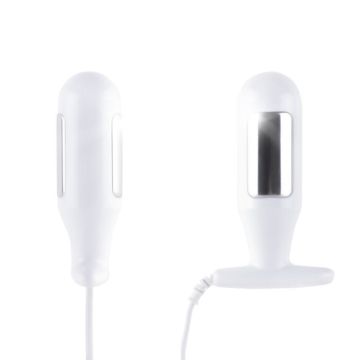
As we age, it seems that everything progressively goes downhill. Your skin, your libido, your pelvic floor. This is the fault of the dreaded, unavoidable phenomenon that is menopause. Does it instil you with fear? Well, what if we told you that Kegel8 could help?
Unfortunately we don’t have a magic menopause-eradicating wand, but we can offer some top tips for helping you through the process this World Menopause Day.
Set up by the British Menopause Society, World Menopause Day aims to highlight the impact of menopause on every aspect of women’s lives in the UK.
What Causes Menopause?
Some of the main conditions that cause menopause are:
- Ageing – This is the most common cause of menopause. As you approach middle-age, the ovaries slow down their oestrogen and progesterone creation (these hormones regulate menstruation and increase fertility). On average, by the time you are 51, your ovaries will stop producing eggs and you will not experience any more periods.
- Hysterectomy – This surgical procedure removes your uterus (womb). Menopause may not happen immediately if your ovaries remain, but a total hysterectomy (which removes the ovaries as well) can trigger immediate menopause, causing abrupt changes in hormones.
- Chemotherapy and Radiotherapy – These cancer treatment therapies can encourage menopause and can sometimes cause menopausal symptoms during or after treatment.
- Premature Menopause – 1% of women experience primary ovarian insufficiency that causes an early menopause. There is no definite cause of this, but it can stem from genetic factors or autoimmune disease.
What are the Symptoms of Menopause?
In the months leading up to menopause (perimenopause) you can experience a variety of symptoms, including:
- Hot flushes
- Vaginal dryness
- Night sweats
- Sleep problems
- Reduced sex drive
- Weight gain
- Mood changes
- Hair thinning
How Does Menopause Affect Your Daily Life?
75% of women in the UK say that menopause has caused them to change their lives, with a further 50% admitting that menopause has had a negative impact on them. The menopause can impact on your:
- Work life – 47% of women who have needed to take a day off work due to menopausal symptoms didn’t tell their employer the real reason.
- Social life – Over 33% of women feel less outgoing in social situations, and 23% feel more isolated.
- Sex life – 42% of women admit that they don’t feel as sexually attractive since experiencing the menopause.
- Partner’s life – 28% of partners say they often end up having arguments over the issue, and 38% feel helpless in supporting their partner through menopause.
How to Improve Your Menopause
It isn’t all doom and gloom. There are numerous things that you can do to help with your menopausal process. Kegel8’s top tips are:
- Kegel! – Your hormone deficiency during menopause can cause the pelvic floor muscles to weaken leading to a higher risk of developing a pelvic floor disorder such as incontinence or prolapse. Practice your Kegels daily to keep your pelvic floor strong; it can even improve your sex life! If you’re finding manual exercises hard, try using the Kegel8 Ultra 20 Electronic Pelvic Toner to effectively target and contract your pelvic floor muscles.
- Supplement – Collagen is the vital glue that holds the pelvic floor in place. We lose this vital protein as we age, so it’s worth supplementing it to keep your pelvic floor flexible and strong and to keep pelvic floor disorders at bay.
- Oestrogen cream – If you suffer from vaginal dryness, your GP may prescribe you with oestrogen cream. This can be more effective than lubricants and moisturisers for some menopausal women, but it can cause some side effects.
- #PositivePause - In the run up to World Menopause Day, the menopause experts at Hot Flush and the physiotherapists at #PelvicRoar are raising awareness of where women can learn about having a positive menopause in a straightforward way.
Further Information
Each of these tips can help support and ease you through the menopausal process. Don’t be afraid to visit your GP if you have any concerns.
For more information about menopause and #PositivePause, visit the Hot Flush team for helpful guidance around menopausal symptoms, and support during the process.


Sources
[1] BMS (2016) British Menopause Society Fact Sheet [online]. British Menopause Society [viewed 21/09/2018]. Available from https://thebms.org.uk/_wprs/wp-content/uploads/2016/04/BMS-Infographic-10-October2017-01C.pdf
[2] Cancer Research UK (2016) What is Radiotherapy? [online]. Cancer Research UK [viewed 31/08/2018]. Available from https://www.cancerresearchuk.org/about-cancer/cancer-in-general/treatment/radiotherapy/about
[3] Macmillan Cancer Support (2018) Chemotherapy [online]. Macmillan Cancer Support [viewed 31/08/2018]. Available from https://www.macmillan.org.uk/information-and-support/treating/chemotherapy
[4] Mayo Clinic (2017) Menopause [online]. Mayo Clinic [viewed 30/08/2018]. Available from https://www.mayoclinic.org/diseases-conditions/menopause/symptoms-causes/syc-20353397
[5] NHS (2016) Hysterectomy [online]. NHS [viewed 31/08/2018]. Available from https://www.nhs.uk/conditions/hysterectomy/
[6] NHS (2015) Menopause [online]. NHS [viewed 30/08/2018]. Available from https://www.nhs.uk/conditions/menopause/
[7] Pelvic Floor First (2016) Menopause [online]. Continence Foundation of Australia [viewed 31/08/2018]. Available from http://www.pelvicfloorfirst.org.au/pages/going-through-menopause-or-post-menopausal.html





